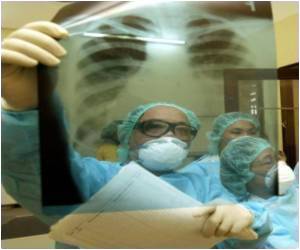
In an attempt to circumvent this problem researchers from Universitair Ziekenhuis Brussel, in Belgium, tested the effect of adding RNAi to standard TKI or antibody therapy in NSCLC cells. Proteins are made in the cell's cytoplasm, but DNA is stuck inside the nucleus. Consequently, in order to produce a protein, a cell must first copy the gene's DNA sequence, producing an intermediary molecule called RNA which is able to travel out of the nucleus to the cytoplasm. RNAi 'interferes' with the mechanism for producing proteins by blocking proper function of the intermediary RNA stage.
A team led by Prof De Grève and his co-worker, Gang Chen, found that the small interfering RNA (siRNA) molecule they designed was able to inhibit EGF protein production in all the NSCLC cell lines tested. It was also able to slow down cell growth and increase cell death (apoptosis) in all the cell lines – although some responded better than others. When they tested siRNA alongside TKI and or monoclonal antibodies they discovered that the siRNA had an additional positive effect on the cell lines than the standard treatment alone.
Prof De Grève explained, "Some EGFR mutations were more sensitive to siRNA than others - we saw especially good results against the mutation in exon 19. We think that this reflects the fact that the growth of cells with this mutation is driven by EGFR, but that other mutations are not as active. A different EGFR mutation produces cells which cannot be inhibited by TKI, however even these cells were sensitive to siRNA."
These results provide hope for NSCLC patients with EGFR mutations, as it could potentially enhance TKI therapy. It may also help those who do not respond to TKI, or who have become resistant to TKI therapy. Additionally this treatment may benefit another group of patients where the gene for EGFR is too active in their cancer and too much EGFR is produced.
Source-Eurekalert













